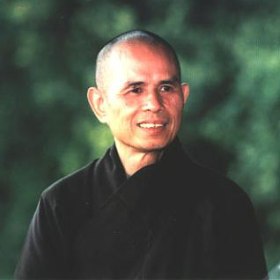There is no enlightenment outside of daily life.
In true dialogue, both sides are willing to change.
Because of your smile, you make life more beautiful.
We have more possibilities available in each moment than we realize.
Breath is the bridge which connects life to consciousness, which unites your body to your thoughts.
If your cup is small, a little bit of salt will make the water salty. If your heart is small, then a little bit of pain can make you suffer. Your heart must be large.
Hope is important because it can make the present moment less difficult to bear. If we believe that tomorrow will be better, we can bear a hardship today.
Life
Birth: Thich Nhat Hanh was born Nguyen Xuan Bao born October 11, 1926 in central Vietnam
Realization:Nguyen Xuan Bao joined a Zen monastery at the age of 16, studied Buddhism as a novice, and was fully ordained as a monk in 1949. He is commonly referred to as Thich Nhat Hanh
Death: Alive.
Teaching Style:Thich Nhat Hanh teaches, writes, and gardens; and he leads retreats worldwide on the art of mindful living. He travels internationally giving retreats and talks. His life has since been dedicated to the work of inner transformation for the benefit of individuals and society.He founded the School of Youth Social Service. He teach at various schools, colleges and universitys.
Fame:Thich Nhat Hanh is an expatriate Vietnamese Zen Buddhist monk, teacher, author, poet and peace activist. With the exception of the Dalai Lama, he is today’s best known Buddhist teacher. He has published more than 100 books, including more than 40 in English. He has become an important influence in the development of Western Buddhism. As one of the most important religious thinkers and activists of our time, he has played an important role in the transmission of an Asian spiritual tradition to the modern, largely secular West.
Legacy:Thich Nhat Hanh credits the thirteenth-century Vietnamese King Tran Nhan Tong with the origination of the concept. Tran Nhan Tong abdicated his throne to become a monk, and founded the still dominant Vietnamese Buddhist school, the Bamboo Forest tradition. Thich Nhat Hanh’s teachings and practices appeal to people from various religious, spiritual, and political backgrounds.
Teaching
Thich Nhat Hanh’s key teaching is that, through mindfulness, we can learn to live in the present moment instead of in the past and in the future. Dwelling in the present moment is, according to Nhat Hanh, the only way to truly develop peace, both in one’s self and in the world.
Thich Nhat Hanh’s teaching is notable for its emphasis on joy, engagement in the world, and integrating the practice of mindfulness into daily life. To be mindful is to become aware of what is going on in our bodies, our minds, and the world around us. His teaching centers on conscious breathing and the mindful awareness of each breath.
According to Thich Nhat Hanh any act is an opportunity to touch the sacred, whether it is washing the dishes or driving a car.
Thich Nhat Hanh asks us to stop the war inside ourselves, to quiet our distracted minds and to return to the present moment. “If we are peaceful, if we are happy, we can smile, and everyone in our family, our entire society, will benefit from our peace.” This allows us to discover, that “There is no way to happiness – happiness is the way”.
Thich Nhat Hanh told that “If you look deeply into the palm of your hand, you will see your parents and all generations of your ancestors. All of them are alive in this moment. Each is present in your body. You are the continuation of each of these people.”


[…] Author: Sarlo Guru Rating Source: Guru Ratings Guru Rating by: Sarlo Guru: Nhat Hanh […]
Perfect!Amazing!Super!Thank you very much
==
http://webuyuglyhousesnow.info/how-much-money-is-your-home-worth/
Howdy, i read your blog occasionally and i own a similar one and i was just wondering if you get a lot of spam comments? If so how do you prevent it, any plugin or anything you can advise? I get so much lately it’s driving me mad so any assistance is very much appreciated.
Nice information, many thanks to the author. It is incomprehensible to me now, but in general, the usefulness and significance is overwhelming. Thanks again and good luck!